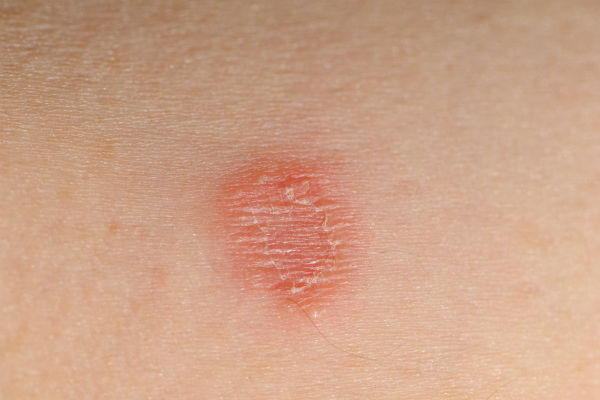Somehow the idea of contracting a parasite seems far worse than catching a virus or bacteria. If worms freak you out, there is good news—ringworm is not a worm, it is a fungus. The bad news is that ringworm is highly contagious and can spread from dogs to humans.
What Does Ringworm Look Like?
Ringworm in dogs usually looks like a circular patch of hair loss that may be inflamed or scabbed, or just bare, dry looking skin. The hair around ringworm lesions is brittle and breaks easily, and while the lesions do not usually itch on dogs, the same is not true for humans.
Ringworm in humans typically looks like a circular, red rash on the skin. It can be quite itchy, and even if you haven’t heard of ringworm before, you’ve probably heard of it by its other names: athlete’s foot or jock itch. In other words, ringworm is one of the main reasons why people wear shower shoes in public locker rooms.

How is Ringworm Spread?
Ringworm is a fungus, which means it is spread through spores. People and dogs pick up these spores through direct contact with an infected animal or person, or by indirect contact with a spore left in the environment.
For instance, if an infected dog sleeps on the couch, she will leave behind spores, which are attached to her brittle, ringworm-infected hair. The next time you sit on the couch, you unwittingly expose yourself to the infection. Bedding, carpets, grooming tools, food bowls, and clothing can all be contagious in a house with ringworm. As if that wasn’t bad enough, the spores can stay contagious for up to 18 months.
Learn more about worms in dogs
Is Ringworm Contagious to Other Animals and People?
So what happens if your veterinarian diagnoses your dog with ringworm? Does this mean that you are at risk of catching the fungus? Unfortunately, the answer is yes. You can also transmit it to others if you are infected.
Just about any species of domestic animal can get ringworm, and so can you. Cats, dogs, livestock, children, and adults are all susceptible, so if one member of your household is infected, keep your eyes peeled for signs of a spreading infection.
Washing your hands frequently and thoroughly is recommended after touching any animals, especially those suspected of having any visible lesions. It's also helpful to know that ringworm is seen far more frequently in cats than it is in dogs.
Treating Ringworm
Since ringworm is highly contagious, you need to be aware of how it is treated in animals and also in people.
Treating Ringworm in Dogs
In dogs, a veterinarian will diagnose ringworm using a diagnostic test. He or she will then prescribe a topical antifungal medication, such as a cream, ointment, or medicated shampoo. This helps treat and contain the infection. Your veterinarian may also prescribe an oral antifungal medication, as well. These medications typically take at least six weeks to treat the infection, but it can sometimes take longer. If you have other dogs, talk to your veterinarian about treating them for ringworm, even if they are not outwardly showing signs.

Treating ringworm is only part of the process. All of those spores are still in the environment, waiting to reinfect your dog. There is no quick fix for decontaminating your home. You will need to clean up all of the shedding hair and treat your home with a disinfectant recommended by your veterinarian. Owners with hardwood floors will probably find this easier than those with carpets. If you can’t contain your dog to an easy-to-clean area, daily vacuuming of hair and furniture can help reduce the risk of infection.
Treating Ringworm in People
So what happens if you or a family member gets ringworm from your dog? It depends, according to the Centers for Disease Control and Prevention (CDC), on where the ringworm pops up. Ringworm on the skin, commonly called athlete’s foot or jock itch, can usually be treated with an over-the-counter medication, like an anti-fungal cream, lotion, or powder. Ringworm on the scalp, on the other hand, usually requires a trip to the doctor and a prescription antifungal medication.
Sometimes, over-the-counter medications are not enough. If your ringworm infection persists after treatment, you should make an appointment with your doctor.
Ringworm is not life threatening, just irritating. Now that you know what to do about this highly contagious fungus, protect yourself and your two- and four-legged family members by taking the necessary precautions. For more information, talk to your veterinarian.


